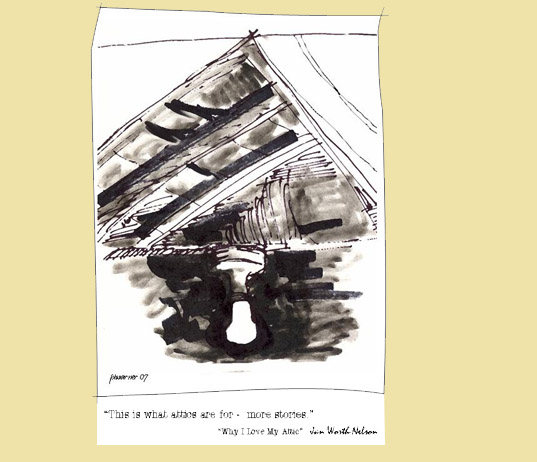![]()
Forty Years Later with two Old Testament Dudes
On Dewey Whitwell's Knee, I Consider My Second Amendment Rights
![]()

"Jan Worth published her great novel Nightblind herself (with iUniverse) and thank goodness she did. She worked on it for about thirty years she says in the Acknowledgements.
Worth’s book is splendid and delightful, wise and witty and rich. Twenty times better, say, than something like Eat, Pray, Love...." (Read the full review...)
![]()

Essays > Why I Love My Attic

Gaston Bachelard, that old French hippie who wrote The Poetics of Space in 1958 when we Baby Boomers were growing up, thought everybody should live in a house with an attic, especially in childhood.
He said the stairs to the attic “bear the mark of ascension to a more tranquil solitude.” He said (speaking with pre-Sixties gender exclusion for which I forgive him) “we can no longer remain…men with only one story.” Bachelard thought we all need niches, corners, nests for daydreaming.
So I’m writing this in my attic, sitting cross-legged on the dusty plank floor. To my left is a pile of rolled up pink insulation, and to my right is the opening for the ladder, and the scary ladder itself, at the moment anchored on the landing below. The only light is a single bulb attached to the peaked beam. It doesn’t throw enough illumination into the corners, so I’m a bit uneasy. I can only stand up in the middle. But the attic smells great – woody and not at all mildewed, as if the beams up here, protected from all the foofaroo of human life below since the house was built in 1935, have aged more slowly.
Anyway, despite a bit of healthy caution, I’m up here because I like attics. Not the terrifying, imprisoning attics of Anne Frank or poor Bertha/Antoinette in Jane Eyre, but the attics you can sneak up to freely. I love that houses in the Midwest almost all have attics. I love this specific attic. I like that there’s no furniture – nothing to match or arrange, or best of all, dust. I like that I’d probably never bring my friends up here. It’s private. I like how it’s shaped like a big lean-to, or a tent – something akin to camping – and I like how this primitive space surreptitiously lords it over two floors of civilized life, stylish beds, and formal dining. I love that there’s a trap door with a blue strap hanging down, and I like that to get up here we have to scare ourselves silly pulling down the trap door and the ladder that screeches and slides down unnervingly on its old metal rollers every time.
I spent several years of my childhood sleeping in the attic of a big brick parsonage in Ohio. My parents thought it was a bit odd that I liked it up there, with its plastered slope ceiling, tiny half-moon window, and my grandma’s antique bed with a horsehair mattress. But I relished that attic. Among other luxuries, I discovered my first erotic literature up there, burrowed under a quilt, startled to discover in the Song of Solomon lines like “A bundle of myrrh is my beloved unto me; he shall lie all night betwixt my breasts,” and “”Open to me, my sister, my love, my dove, my undefiled: for my head is filled with dew and my locks with the drops of the night.” This was great! I’ve liked attics ever since.
My present attic is already about a quarter full. I survey my ironwood kava bowl from Tonga, three feet across, cracked and unusable from the dry furnace air of my first Flint winter; my high school yearbooks; a letter to myself bitterly explaining why an old boyfriend dumped me. Some day I’ll throw it all away.
And then, I unearth a surprise bonanza: a single box of books left by somebody else. How could I have missed this? Brushing off dust, I lift out a treasure trove.
What’s this? Dick Kent, Fur Trader, copyright 1937, by Milton Richards. On the frontispiece, a dashing fellow with a belted plaid coat, knee-high boots and a…fedora! He’s holding back a Mountie; they’re at the window of a log cabin. Inside, three bad-looking dudes hunch over a secret. The caption: “Dick, happening to glance through the window, drew back suddenly with a cry of surprise.”
And here’s Six Years in the Malay Jungle by Carveth Wells, copyright 1923, beginning with this fabulous first sentence, “One morning in May, after getting out of bed on the wrong side and making the baby cry, I determined to quit my job of Assistant Professor of Civil Engineering and look for something dangerous.”
And finally, my instant favorite, Bomba, the Jungle Boy, or, the Old Naturalist’s Secret, copyright 1926, by Roy Rockwood. In its fourth paragraph lies this delicious sentence, “From a distance came the screams of parrots and the howling of monkeys, but otherwise the jungle was silent.”
My visit to my attic has yielded a major cache. Happily but gingerly, I go down butt first on each of the ladder’s narrow rungs, the books in my arms. This is what attics are for: more stories. Bachelard undoubtedly would be pleased.



















